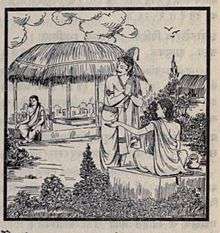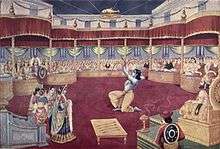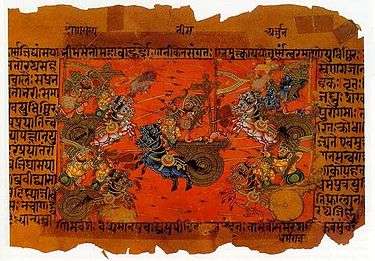Drupada
| Drupada | |
|---|---|
| Mahabharata character | |
 Upyaz showing his elder brother to Drupada | |
| Information | |
| Family | Prishata (father) |
| Children | Shikhandi, Dhrishtadyumna, Draupadi |
Drupada (Sanskrit: द्रुपद, lit. firm-footed or pillar[1]), also known as Yajnasena (Sanskrit: यज्ञसेन, lit. father of Draupadi), is a character in the Mahābhārata. He was the king of the land of Southern Panchala.[2] His capital was known as Kampilya.[3] His father's name was Prishata.
Conflict with Drona
Drupada, son of the King Prishata, and Drona studied together under the tutelage of Rishi Bhardwaja, Drona's father. They became great friends and Drupada assured Drona that once he became a king, he would share half of his kingdom with him. While Drupada became a king after the death of his father, Drona lived a life of poverty. Unable to feed his son, Drona approached Drupada for help. Drupada, now conscious of the difference of status between them, refused to acknowledge Drona's friendship and shunned Drona calling him a beggar. Drona was later employed by Bhishma to train the sons of Pandu and Dhritarashtra. After the military education of the Kauravas and the Pandavas ended, as his gurudakshina, Drona asked the princes to defeat and capture Drupada. Firstly all kauravas brothers attacked Drupada to defeat him but Drupada defeated all of them.[4] Then the Pandavas, led by Arjuna (as he was a great archer and fighter), defeated Drupada, bound him in ropes and brought him to Drona. Drona set Drupada free, but retained half of the kingdom that had been promised to him. Humiliated Drupada sought vengeance against Drona, but he realized that he could not match Drona's might. So, Drupada performed a great yajna called Putrakameshti yajna (vedic ritual of fire sacrifice) to beget a daughter who could marry Arjuna and a son who could slay Drona. From the fire of the yajna, twins Dhrishtadyumna and Draupadi were born. Years later, Draupadi married Arjuna and later in the Mahabharata war, Dhrishtadyumna beheaded Drona.[5][6]
Svayamvara of Draupadi

Drupada arranged a svayamvara (public self-choice of husband) for his daughter Draupadi. To win Draupadi's hand, the kings invited had to bend an enormous bow and shoot five arrows simultaneously through a revolving ring onto a target far away. All the kings failed to string the bow and got defeated in task,[7] when Karna was about to succeed he was stopped by draupadi.thereafter Arjuna succeeded in the event and Drupada accepted him as his son-in-law. When Draupadi was taken back to Kunti, she asked her sons to accept whatever had been won as common property. The imperative of acting on their mother's words and the propriety of marriage to five husbands was discussed at Drupada's palace. Rishi Vyasa supported Kunti's proposal and sanctioned the marriage.[8]
Family
Drupada had eleven sons along with Dhrishtadyumna. Their names were: Satyajit, Shikhandi (Shikhandi was originally born as a girl, and used to be the princess of Kashi, Amba who wanted to take revenge on Bhishma), Uttamauja, Kumar, Yudhamanyu, Vrika, Panchalya, Suratha, Shatrunjaya and Janamejaya.[9] Notably, Satyajit eventually ascended to Panchal's throne, Shikhandi was instrumental in the death of Bhishma, and Uttamaujas and Yudhamanyu protected Arjuna's chariot throughout the war. Most of them died in the Mahabharata war. Dhrishtadyumna, Shikandi, Yudhamanyu and Uttamauja were killed by Ashwatthama on the last day of the war.[9]
Role in Kurukshetra War
Drupada fought on the side of the Pandava's in the Kurukshetra War. He was a maharathi.[10] He along with Virata fought Drona on the 15th day of the war who killed both of them.[11]
References
- ↑ "Sanskrit Dictionary for Spoken Sanskrit". spokensanskrit.de. Retrieved 2015-05-20.
- ↑ "The Mahabharata, Book 1: Adi Parva: Sambhava Parva: Section CXXXI". sacred-texts.com. Retrieved 2015-05-20.
- ↑ "Mahabharat - Draupadi'S Swayamvar". urday.in. Archived from the original on 10 March 2014.
- ↑ "The Mahabharata, Book 1: Adi Parva: Sambhava Parva: Section CXL". www.sacred-texts.com. Retrieved 2018-01-15.
- ↑ Sargeant, Winthrop; Smith, Huston (2009). The Bhagavad Gītā. SUNY Press. p. 16. ISBN 978-1-4384-2841-3.
- ↑ Bonnefoy, Yves (1993). Asian Mythologies. University of Chicago Press. p. 56. ISBN 978-0-226-06456-7.
- ↑ "The Mahabharata in Sanskrit: Book 1: Chapter 179". www.sacred-texts.com. Retrieved 2018-01-15.
- ↑ Kapoor, Subodh (2002). The Indian Encyclopaedia. Cosmo Publications. p. 6894. ISBN 978-81-7755-257-7.
- 1 2 Story of Drupad Archived 28 June 2012 at the Wayback Machine.
- ↑ "MAHABHARATA - Yudhistra`s Permission". urday.in. Archived from the original on 31 May 2014. Retrieved 20 May 2015.
- ↑ Ganguli, K.M. (2014). The Mahabharata, Book 7: Drona Parva:. Netlancers Inc.

